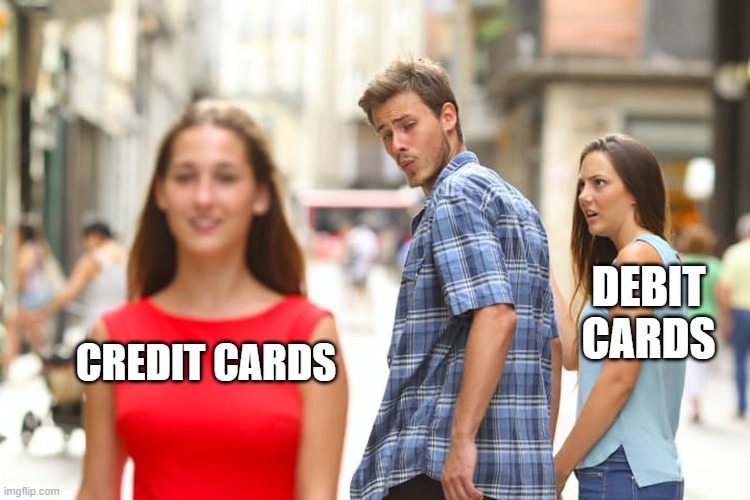I mentioned in my previous post that credit cards can be an amazing financial tool to have.
If you feel disheartened because you’re a student or don’t earn enough to be eligible for a credit card, don’t be.
In this post, I’m going to share with you 2 ways you can get your very own credit card as a student and why you should use them.
1: STUDENT CREDIT CARDS
The first and easier way to get your own credit card is to apply for a student credit card.
These are cards that are specifically meant for students, and they are super easy to apply for.
The only requirement is that you need to be a tertiary student from an eligible institute.
Note that different banks recognise different schools as eligible institutes. In order to find out which schools are eligible, check the respective bank’s website.

Student credit cards typically only have a credit limit of $500.
There is a decent range of student credit cards available offered by various banks such as DBS, Maybank, Citibank, Standard Chartered and CIMB.
It is also worth noting that the CIMB and Standard Chartered student cards don’t actually require you to be a student.
This means if you’re a working adult who doesn’t earn enough to qualify for other credit cards, you can still consider these options.
These cards do earn rewards, but none of them are particularly great.
For example, the Maybank eVibes card offers 1% cash rebate and the Citi Clear card offers 0.4 miles per $1 spend.
While it’s better than nothing, it is considerably worse than debit cards such as the DBS Visa debit card which offers up to 3% cashback.
This means that using student credit cards to earn rewards isn’t a great idea.
Instead, if you do use a student credit card, you should just make 1 or 2 transactions with it every month and use a better debit card for the rest of your spending.
This is so that you have a statement to pay off every month, which allows you to improve your credit score if you pay it off punctually.
However, student credit cards are recognised as regular credit cards.
This means that if a restaurant offers some discount for a particular bank’s credit card, if you own a student credit card from the same bank, you are entitled to that discount.
So even though you may not earn much rewards with them, student credit cards may help you save some money when you go out.
2: SECURED CREDIT CARDS
There are 2 types of credit cards – secured and unsecured. When people talk about credit cards, they are usually referring to unsecured credit cards.
But in order to be eligible for most of them, you need to have a minimum annual income of S$30k.
If your annual income is below S$30k or you have no income, you have the option to apply for a secured credit card.
To do so, you need to have a fixed deposit (FD) of at least S$10k with the bank, which they will use as both your credit limit and collateral.
A fixed deposit is like a savings plan. You deposit a fixed amount of money with the bank to earn interest. The longer you leave your money deposited, the higher the interest, but there may be penalties for early withdrawal of funds (ie forgoing your accrued interest).
This means that you can’t spend more than what you have with the bank and if you ever fail to pay your statement when it is due, the bank will deduct the statement balance from your fixed deposit.
So if you’re a student with no income but have S$10k in savings that you don’t need, applying for a secured credit card is another way to get your hands on a credit card.
Secured and unsecured credit cards work exactly the same way.
They earn rewards at the same rate, entitle you to the same benefits and have the same associated fees.
As compared to student credit cards that don’t earn much rewards, secured credit cards typically earn better rewards than debit cards.

This means that you’ll probably want to put as much of your spending as possible on your secured credit card rather than on your debit card in order to maximise your rewards.
So if you want to use credit cards to earn rewards as a student, secured credit cards are the way to go.
However, note that when you graduate and start earning income, you are not able to convert your credit card from secured to unsecured.
Instead, you can apply for an unsecured credit card and close your secured credit card while maintaining any rewards/points balances on your card.
So you don’t have to worry about your rewards disappearing when you eventually switch to an unsecured card.
Why Credit Cards?
Whether it is a student or secured credit card, I would strongly advise you to apply for one and start using it ASAP.
Build Credit Score
The first reason is to start building your credit score.
As I mentioned in my previous post, your credit score has many implications – loan approval, sum of loan, interest rate on loan and even employment opportunities.
And the only way to have a credit score and improve it is to have a line of credit, ie by owning a credit card.
One of the factors affecting your credit score is your history of timely payments, which refers to the number of times you have paid off your statement punctually since your inception of credit.
Since you only have 1 statement every month, the earlier you start using a credit card and making transactions every month, the more statements you will have to pay off.
The more times you pay off your statement punctually every month, the better your credit score will be – and the more you will benefit in the future.
Cultivate Good Credit Habits
Next, it is important to start cultivating good credit habits early on such as paying off your statement punctually every month and spending within your means.
This is especially so if you don’t identify yourself as a responsible person or tend to always put things off to the last minute.
Punctual Payments
Paying off your credit statement on time every month is extremely important because credit cards charge notoriously high interest rates on your credit balance – that is, credit that is not paid off.
Interest rates can be as high as 26.8%. This means that if you spend $100 in credit and forget to pay it off, you will need to pay $126.80 the following month instead.

Not only will you need to pay more money for no reason, but it tarnishes your credit score as well.
If you miss too many payments, chances are that you’ll be blacklisted by the bank and may have trouble getting loans/credit card approvals in future.
Maybe you think that you can just go to a different bank to get your loans/credit cards.
The problem is that your credit score is managed by Credit Bureau Singapore (CBS) and not the individual banks.
When banks report to CBS that you have a history of late payments, all the banks in Singapore will have access to that information when evaluating your credit risk in future.
This may result in you being unable to get loans/credit cards from any bank at all, which puts you at a huge disadvantage.
Spending Responsibly
With student credit cards, your credit is limited to $500/month, so you won’t get to spend excessively.
With secured credit cards, you will never be able to spend more than what you can afford to pay off.
Hopefully, having these constraints will help you cultivate the habit of spending your credit responsibly and ingrain the idea that you should treat credit as though it is money.
This way, when you eventually start using unsecured credit cards, you will continue this habit and not spend excessively just because you can.
To summarise,
Students have access to 2 types of credit cards: student or secured.
| Credit Card | Student | Secured |
| Requirements: | Be a Singaporean / PR student in an eligible institute | Have minimum $10k in a FD |
| Credit limit: | $500 | Equal to your FD |
| Good for: | Building credit score |
Building credit score Earning rewards |
Student credit cards and secured credit cards serve different purposes and fit into different lifestyles.
In order to decide which is more suitable for you, you need to know why you want to start using credit cards and how they will fit into your current lifestyle.
Nonetheless, as long as you start using a credit card responsibly, you will be well on track to having a strong financial advantage as compared to your peers in the future.